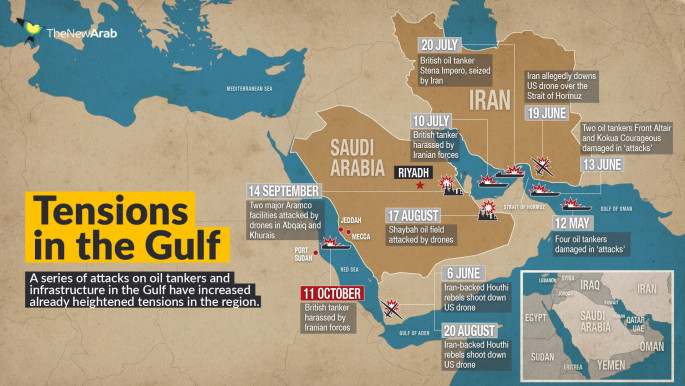Kuwait conveyed messages from Iran to regional arch-rival Saudi Arabia, Bahrain amid Gulf tensions
Khaled al-Jarallah said the message was conveyed, however “no answers” have yet emerged as a result.
The comments came after Iran said President Hassan Rouhani sent letters to Saudi Arabia's King Salman on Tuesday in a bid to form "bilateral ties”, according to reports by Tasnim news agency.
"The theme of the letters has been regional peace and stability," government spokesman Ali Rabiee was quoted as saying Monday.
"We believe multiple bilateral ties could be shaped in the region, and the US pressures should not cause a distance between the neighbours," Rabiee added.
The letters are the first of their kind since the two nations cut off relations in 2016.
Rabiee added that letters had also been sent to Bahrain's King Hamad bin Isa Al Khalifa.
President Rouhani pushed Iran's security and cooperation project in separate letters sent to various members of the Gulf Cooperation Council (GCC) and Iraq, Foreign Ministry Spokesperson Abbas Mosavi said Saturday.
The GCC is a six-nation bloc that groups Saudi Arabia, the UAE, Bahrain, Kuwait, Qatar and Oman.
 |
The letters promoted the Hormuz Peace Initiative - a plan for peace in the region that sidelines US involvement.
Iran Foreign Minister Mohammed Javad Zarif pitched the Islamic Republic's Gulf security plan to neighbouring nations last month after President Rouhani announced the plan at the UN General Assembly in September.
Rouhani called on Gulf nations including arch-rival Saudi Arabia to join it but without giving futher details at the time.
In an article published in October by Kuwait's Al-Rai daily, Zarif said that the plan offered the chance of "expansive security" and cooperation between Iran, Saudi Arabia, Iraq, Oman, the UAE, Kuwait, Qatar and Bahrain.
Read more: US, six Gulf allies slap sanctions on dozens of Iran-Hezbollah entities
Cooperation could include areas such as a regional non-aggression pact, combatting terrorism, cybersecurity, energy and freedom of navigation, Zarif said.
"In order to save the region from the edge of ruin, we feel the necessity of realising a new discourse more than ever," he wrote in the article, a translation of which was provided by his ministry.
"The fate of the people and nations of the Persian Gulf is entwined ... either everyone benefits from security in the region or everyone will be deprived of it," Zarif said.
Tensions have risen in the Gulf since last year when US President Donald Trump unilaterally abandoned a 2015 nuclear deal between major powers and Iran and began reimposing crippling sanctions.
Read more: Saudi-Israeli relations: The emergence of a new alliance
They flared again this May when Iran began reducing its own commitments under the deal and the US deployed military assets to the region. Since then, ships have been attacked, drones downed and oil tankers seized.
In June, Trump called off air strikes against Iran at the last minute after the Islamic Republic's forces shot down a US drone.
September saw twin attacks on Saudi oil infrastructure, which knocked out half the kingdom's production, drew accusations of blame against Iran not only from the US but also from its European allies.
Follow us on Twitter and Instagram to stay connected





 Follow the Middle East's top stories in English at The New Arab on Google News
Follow the Middle East's top stories in English at The New Arab on Google News


